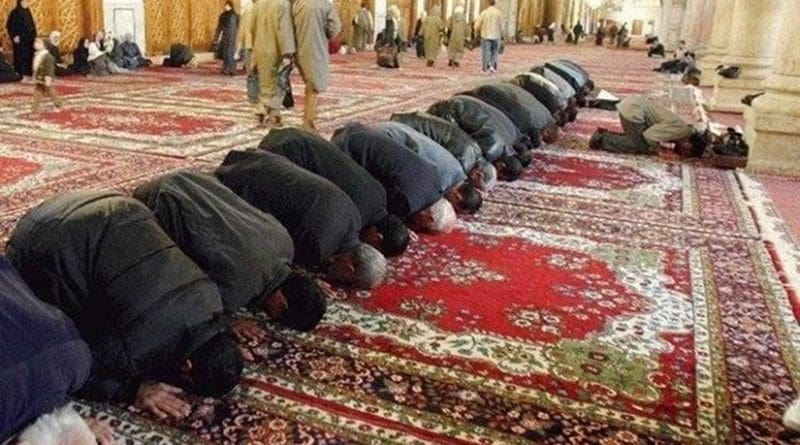Jews, Muslims And The Rise Of Scapegoating – OpEd
A Muslim woman and a Jewish man were kicked out of a Donald Trump presidential campaign rally after staging a silent protest against the Republican frontrunner, who has called for a ban on Muslims entering the US.
Rose Hamid, a 56-year-old flight attendant, wearing a head scarf and loose fitting green shirt reading “Salam. I come in peace.” stood in silence looking at the podium alongside a Jewish immigration attorney named Marty Rosenbluth.
Both of them were wearing “yellow star-shaped badges that bore the word ‘Muslim’ and were intentionally reminiscent of the yellow badges Jewish people were forced to wear under Nazi rule.
As always, this wonderful act of Jewish-Muslim solidarity, received scant attention in the media compared to the hateful scapegoating acts of Anti-Semitism and Islamophobia.
For example, attacks on Britain’s 280,000 Jews and 2.5+ million Muslims, including assault and harassment, soared by more than 60% over the past year, London police statistics show.
The Metropolitan Police dealt with 483 anti-Jewish incidents in the 12 months between November 2014 and November 2015, a 62% increase over the same period last year. The London police also recorded a similar 64% rise in anti-Muslim incidents, for a total of 818 such attacks.
The fact that there was an almost identical rise (60%+) in hate crimes against both Jews and Muslims is evidence that the source of these hate crimes springs from within a small minority of the majority population that is scapegoating both Jews and Muslims after years of high unemployment and economic distress.
Widespread doubt about America’s future has split Americans in half — 49% to 49% — on whether “America’s best days are ahead of us or behind us.” This anxiety had produced a specific scapegoat; the religion of Islam, as can been seen in a major rise in Islamophobia in the U. S.
An American poll by the nonpartisan Pew Research Center released 12/15/15 found that a large majority of white evangelical Protestants, as well as smaller majorities of older Americans and those with less education, said Islam is more likely than other religions to encourage violence among its believers.
Overall, Americans split evenly on the question of whether Islam is more likely to encourage violence than other religions; 46% saying it is more likely and 45% saying it was not, the Pew poll found. That close division has been constant for most of the last decade in Pew polls.
But today, among Republicans, 68% call Islam more violent, Pew found, while among Democrats, only 30% did. Among people who identified themselves as conservative Republicans, 77% called Islam violent, while among self-identified liberal Democrats, 73% said it was no more violent than other religions.
And another poll released a month prior to the Pew study shows that a majority of Americans (56%, including even larger majorities in all the major Christian denominations) say the values of Islam are at odds with American values according to the Public Religion Research Institute’s annual American Values Survey (of 2,695 U.S. adults).
But not all American religious communities have the same views of Islam. Three large groups of Americans had a major increase in Islamophobia; and three smaller groups only had a small rise, or no rise at all.
The three groups of Americans having large numbers of people agreeing with the statement that the values of Islam are at odds with American values are:
- white evangelical Protestants (up 14 points to 73 percent from 59 percent in 2011);
- white mainline Protestants (up 16 points to 63 percent from 47 percent);
- and Catholics (up 20 points to 61 percent from 41 percent).
The three groups that did not show a significant rise in Islamophobia are all American minorities: only 55 percent of black Protestants said Islamic values were incompatible with American values (up only 4 points from 51 percent) ; and among Jews and “nones,” people who claim no religious label, there was no rise at all, because statistically speaking a one point difference (to 42 percent from 41 percent) is well within the surveys margin of error.
Perhaps our religious and political leaders could help improve interfaith relations in 2016 by constantly repeating the important lesson taught by the German Protestant theologian Pastor Martin Niemöller (1892–1984) about the cowardice of German intellectuals following the Nazis’ rise to power; and the subsequent purging of their chosen targets, group after group:
First they arrested Socialists, and I did not speak out— Because I was not a Socialist.
Then they arrested Trade Unionists, and I did not speak out—Because I was not a Trade Unionist.
Then they arrested Jews, and I did not speak out—Because I was not a Jew.
Then they came for me—and there was no one left to speak out for me.

